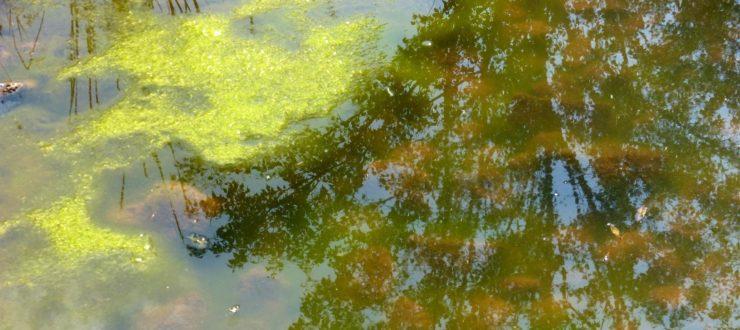
Pond algae gets a bad rap. Take planktonic algae, for instance. This microscopic plant lives throughout the water, providing important benefits to the pond ecosystem by supporting the base of the food chain in a lake. The more food supply available in a body of water, the larger populations of fish it can support. In fact, some pond owners will actually encourage algae growth on purpose to increase fish populations.
Of course, these ponds are probably in the minority. Most natural and manmade ponds have no trouble getting algae to grow in their waters, especially since planktonic algae grow rapidly in response to increased nitrogen, phosphorous, carbon, and potassium in the water, namely fertilizers in the form of manure, septic systems, and urban runoff.
In high enough concentrations, algae can turn from beautifully beneficial to disgustingly deadly. Quick overgrowth, called algae “blooms”, can discolor the water and suffocate the lifeforms that would otherwise keep it under control. While moderate blooms are natural and will eventually be overtaken, large blooms can pose a risk to fish, other wildlife, and even human populations since they deplete the water of oxygen and introduce toxins in the water as they grow, die, and decompose.
Thankfully, there are a few things pond owners can do to minimize the size, density, and danger of algae blooms.
- Reduce fertilizer applications near the pond and any streams that feed into it.
- Keep nearby septic systems maintained properly.
- Directing nutrient rich runoff away from water sources.
- Plant vegetative buffer strips around the pond to help absorb nutrients.
These are long-term preventative measures that naturally keep planktonic algae under control. When and if pond additives or aerators are needed, preventative measure help extend their effectiveness.
Ponds, like every other local ecosystem, require a fine balance of givers and takers to keep the entire environment clean and thriving. If an algae bloom is placing your pond in immediate risk, get immediate results with the latest product from Ragan & Massey: FarmWorks Aquatic Herbicide.
To be notified when this product releases, follow us on Facebook.
